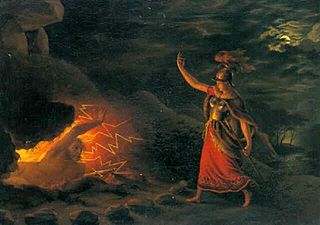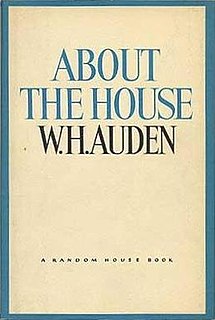Related Research Articles
A clerihew is a whimsical, four-line biographical poem of a type invented by Edmund Clerihew Bentley. The first line is the name of the poem's subject, usually a famous person, and the remainder puts the subject in an absurd light or reveals something unknown or spurious about the subject. The rhyme scheme is AABB, and the rhymes are often forced. The line length and metre are irregular. Bentley invented the clerihew in school and then popularized it in books. One of his best known is this (1905):

Wystan Hugh Auden was a British-American poet. Auden's poetry was noted for its stylistic and technical achievement, its engagement with politics, morals, love, and religion, and its variety in tone, form, and content. Some of his best known poems are about love, such as "Funeral Blues"; on political and social themes, such as "September 1, 1939" and "The Shield of Achilles"; on cultural and psychological themes, such as The Age of Anxiety; and on religious themes such as "For the Time Being" and "Horae Canonicae".
Chester Simon Kallman was an American poet, librettist, and translator, best known for collaborating with W. H. Auden on opera librettos for Igor Stravinsky and other composers.
Michael Roberts, originally named William Edward Roberts, was an English poet, writer, scientist, mathematician, critic and broadcaster, a true polymath who made his living as a teacher.

Frederick Louis MacNeice was an Irish poet and playwright, and a member of the Auden Group, which also included W. H. Auden, Stephen Spender and Cecil Day-Lewis. MacNeice's body of work was widely appreciated by the public during his lifetime, due in part to his relaxed but socially and emotionally aware style. Never as overtly or simplistically political as some of his contemporaries, he expressed a humane opposition to totalitarianism as well as an acute awareness of his roots.
James Martin Fenton is an English poet, journalist and literary critic. He is a former Oxford Professor of Poetry.

Hervararkviða, is an Old Norse poem from the Hervarar saga, and which is sometimes included in editions of the Poetic Edda.
Edward Mendelson is a professor of English and Comparative Literature and the Lionel Trilling Professor in the Humanities at Columbia University. He is the literary executor of the Estate of W. H. Auden and the author or editor of several books about Auden's work, including Early Auden (1981) and Later Auden (1999). He is also the author of The Things That Matter: What Seven Classic Novels Have to Say About the Stages of Life (2006), about nineteenth- and twentieth-century novels, and Moral Agents: Eight Twentieth-Century American Writers (2015).
"Funeral Blues", or "Stop all the clocks", is a poem by W. H. Auden which first appeared in the 1936 play The Ascent of F6. Auden substantially rewrote the poem several years later as a cabaret song for the singer Hedli Anderson. Both versions were set to music by the composer Benjamin Britten. The second version was first published in 1938 and was titled "Funeral Blues" in Auden's 1940 Another Time. The poem experienced renewed popularity after being read in the film Four Weddings and a Funeral (1994), which also led to increased attention on Auden's other work. It has since been cited as one of the most popular modern poems in the United Kingdom.
Nationality words link to articles with information on the nation's poetry or literature.
Lachlan Mackinnon is a contemporary Scottish poet, critic and literary journalist. He was born in Aberdeen and educated at Charterhouse and Christ Church, Oxford. He took early retirement from his job as a teacher of English at Winchester College in 2011 and moved to Ely with his wife, the poet Wendy Cope.

Poems is the title of three separate collections of the early poetry of W. H. Auden. Auden refused to title his early work because he wanted the reader to confront the poetry itself. Consequently, his first book was called simply Poems when it was printed by his friend and fellow poet Stephen Spender in 1928; he used the same title for the very different book published by Faber and Faber in 1930, and by Random House in 1934, which also included The Orators and The Dance of Death.

Letters from Iceland is a travel book in prose and verse by W. H. Auden and Louis MacNeice, published in 1937.

On This Island is a book of poems by W. H. Auden, first published under the title Look, Stranger! in the UK in 1936, then published under Auden's preferred title, On this Island, in the US in 1937. It is also the title of one of the poems in the collection.
"The Sea and the Mirror: A Commentary on Shakespeare's The Tempest" is a long poem by W.H. Auden, written 1942–44, and first published in 1944. Auden regarded the work as “my Ars Poetica, in the same way I believe The Tempest to have been Shakespeare’s.”

Nones is a book of poems by W. H. Auden published in 1951 by Faber & Faber. The book contains Auden's shorter poems written between 1946 and 1950, including "In Praise of Limestone", "Prime", "Nones," "Memorial for the City", "Precious Five", and "A Walk After Dark".

About the House is a book of poems by W. H. Auden, published in 1965 by Random House.
John Fuller FRSL is an English poet and author, and Fellow Emeritus at Magdalen College, Oxford.
This is a bibliography of books, plays, films, and libretti written, edited, or translated by the Anglo-American poet W. H. Auden (1907–1973). See the main entry for a list of biographical and critical studies and external links.
"Epilogue For W. H. Auden" is a 76-line poem by Louis MacNeice. It was written in late 1936 and was first published in book form in Letters from Iceland, a travel book in prose and verse by W. H. Auden and Louis MacNeice (1937). MacNeice subsequently included it as the last poem in his poetry collection The Earth Compels (1938). "Epilogue For W. H. Auden" reviews the Iceland trip MacNeice and Auden had taken together in the summer of 1936; the poem mentions events that had occurred while MacNeice and Auden were in Iceland, such as the fall of Seville and the Olympic Games in Berlin.
References
- ↑ Fuller, John (1998). W. H. Auden: A Commentary. London: Faber and Faber. ISBN 0-571-19268-8.
- ↑ Bloomfield, B. C., and Edward Mendelson (1972). W. H. Auden: A Bibliography 1924–1969. Charlottesville: University of Virginia Press|University Press of Virginia. ISBN 0-8139-0395-5.